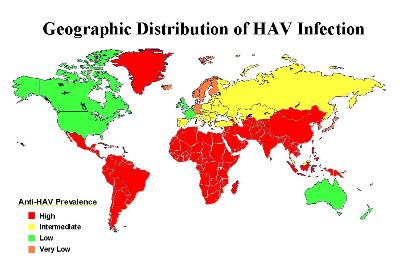Home » Uncategorized »
The 3 Types of Hepatitis
Hepatitis is a virus that can affect the liver. There are several types of it. Hepatitis A, B, and C will be discussed here.
Hepatitis A is the most common type. B and C can also cause hepatitis.
The virus is found in the stool if infected people. It is spread when someone eats or drinks after someone that has come in contact with infected stool. People can get it by not washing their hands after using the bathroom. This sometimes happens in restaurants when employees are not careful enough about washing their hands and then preparing food.
This can also be spread in daycare centers. Children in diapers may get stool on their hands and then touch a toy or other object that others put in their mouths. Workers in these centers can also spread the virus by not washing their hands after changing diapers.
Eating raw or undercooked foods can increase chances of getting the virus. If you travel and go to countries where hepatitis A is common, try to avoid eating uncooked foods or tap water that has not been treated.
If you have been exposed to the virus, it will be two to seven weeks before signs of it show up.
Some of the symptoms of hepatitis are as follows:
Feeling tired; feeling sick to your stomach or feeling hungry; pain on the right side of the belly, under the rib cage (location of liver); fever; sore muscles; yellowing of the skin (janudice); clay-colored stools.
All types of hepatitis have the same symptoms. The only way to tell which type you have is through a blood test.
Call a doctor immediately if you think you have hepatitis A or have been exposed to it. If you have eaten where a server was found to have the virus or if you have children in day care or it could be someone in your house has hepatitis a and you are exposed that way.
The doctor will ask you questions about what symptoms you have and where you have eaten or where you might have traveled. Tests can tell if you have the virus. This will tell if your liver is inflamed and if you have antibodies to the hepatitis A. virus. The antibodies will prove if you have been exposed to hepatitis.
In most cases, hepatitis will go away on its own.
Hepatitis B. is a liver disease caused by infection with the hepatitis B virus which is known as HBV. The liver will be swollen and tender (inflamed), and can develop into permanent damage, such as scarring or liver cancer.
The hepatitis B virus is spread by body fluids, including blood, semen, and other fluids. The symptoms may be flu-like and may cause tiredness, fever, headaches, nausea and vomiting, diarrhea or constipation, and muscle aches. Yellowing of the skin (jaundice) also occurs. The virus will usually go away on its own.
Symptoms of the hepatitis C virus are the same as the others. It is spread through sharing needles, infected blood or from an infected partner. Treatment includes antiviral medications. Sometimes a liver transplant will be needed.





